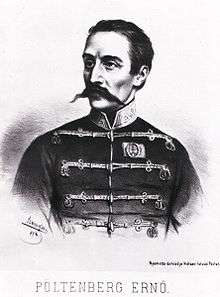Ernő Poeltenberg

Ernő Poeltenberg (February 20, 1808, Vienna - October 6, 1849, Arad) was a honvéd general in the Hungarian Army. He was executed for his part in the Hungarian Revolution of 1848, and is considered one of the 13 Martyrs of Arad.[1][2][3]
Family
He was born into a wealthy Austrian family to Leopold von Poeltenberg Poel, a lawyer. He also had two known sisters:
- Wilhelmina, an honorary member of the Order of St. Anne.[4]
- Amalia, whose husband was Joseph Fackh the Austrian army colonel who in 1848 took over the defense against the Serbs and won the campaign that resulted in the killing of Verbásznál. He attained the rank of General. They had two sons, Charles and Gedo.[5]
Peoltenberg's wife, Kakovszka (Kakowska) was a Polish-born woman who died in Buda on November 13, 1874, at the age of 53. They had three children:
- Guido (1847, Budapest - .Jan. 1889), who had a military career like his father.[6]
- Helena (1842-1922), who married Fackh Ilka. They had three children.[7][8]
Career
In 1830 he entered military service for the Imperial Army, serving two years in the 4th hussar regiment as a second lieutenant. He later took a similar position at another post, but did not receive a promotion for almost 18 years. Stationed with his regiment in Hungary in the Spring of 1848, he requested to be moved to Italy for action.
When the Hungarian revolution took place, he was a supporter and volunteered his service. He first fought against the Croatian Ban Jelacic, and then crossed the Austrian border. However, the Hungarian command disagreed with the plan due to their distrust of his Austrian heritage. Görgey later came under the command of Arthur on October 27, 1848, and Poeltenberg was appointed lieutenant colonel in December.
At the Chapel battle of February 26–27, he distinguished himself and on April 14, 1849 was promoted as the Colonel commanding the 7th Corps, and was promoted to general on June 2. During the summer campaign against Haynau the army was forced to retreat . He participated in the Battle of Komárom (July 2 to July 11), and the Vac battle (July 15-July 17).
After the outnumbering Russian army appeared, he served as a mediator between the Hungarian and Russian armies for the terms of surrender. Next, he was captured, along with the other commanders, by Austrian authorities.
Death
Sentenced to death by hanging, it was carried out on the 5th (he was first among those executed by hanging) at Arad castle. He was hung sometime between six and seven am. Just before his death at the gallows he is credited as having said "Good God who is going to represent the case of the Hungarians!"
References
- ↑ Hermann Róbert. "Az 1849-1850. évi kivégzések". Aetas 2000 (1-2).
- ↑ Merényi-Metzger Gábor: Pöltenberg Ernő keresztelési anyakönyvi bejegyzése, avagy egy 200 éve született aradi vértanú. Hadtörténelmi Közlemények 2008. 3-4. sz. 765-766. old.
- ↑ Neve Pöltenberg alakban is előfordul, azonban az a változat helytelen, saját nevét maga is Poeltenbergnek írta.
- ↑ Vasárnapi Újság 1887/24
- ↑ Országos Hírlap, 1898 november 7.
- ↑ http://www.hhrf.org/erdelyinaplo/2000/0en-40t.htm
- ↑ Vasárnapi Újság 1887/4
- ↑ http://www.mindszentyifjusagihaz.hu/kastely